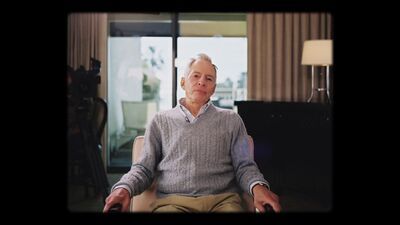Nine years after that landmark TV show, Jarecki and his team have returned with a six-episode follow-up titled simply “The Jinx – Part Two.” The four episodes sent to press don’t really answer that question other than to further reveal a man with such a strong ego and corrupt support system that he thought he could do anything. He talked to them because he didn’t understand consequences. He never had to.
Once again, Jarecki proves himself as good as it gets in the true crime docuseries genre, deftly constructing his episodes in a way that doesn’t just provide details but places them in the context of this defiantly strange story. I wish HBO trusted journalists enough to send the final two, so it’s hard to say if “The Jinx – Part Two” lands with the same impact as the first chapter. But how could it?

The premiere, airing on April 21st, starts while “The Jinx” aired in early 2015, and the world was learning about the crimes of Robert Durst. There are fascinating sequences in which it feels like we’re watching Durst and his team respond weekly to the show about him and seeing Durst’s panic meter rise. By the air date of the last episode in February, he was planning to flee the country, using a fake ID and withdrawing large amounts of cash. He was clearly headed out when he was arrested in New Orleans on the same day that the finale of the first show aired. He might have been gone forever one day later.

Most of this is explained in great detail by Los Angeles County Deputy District Attorney John Lewin, the erstwhile star of the show’s first half. Not only did he interview Durst shortly after that 2015 arrest, but he also led the prosecution against him in 2020 that proves the thrust of this show—the trial for the murder of Susan Berman. While Jarecki’s show included some fascinating evidence, including that truly damning “cadaver letter” that so clearly had Durst’s handwriting on it, the thrust of Lewin’s investigation, at least as far as the show is concerned, was to dismantle the people around Durst. If the original HBO show is any guide, Robert Durst is a talker. Did he confess to anyone? Did he tell anyone he was in Los Angeles when Susan was murdered? What do the people in Robert Durst’s life know?

